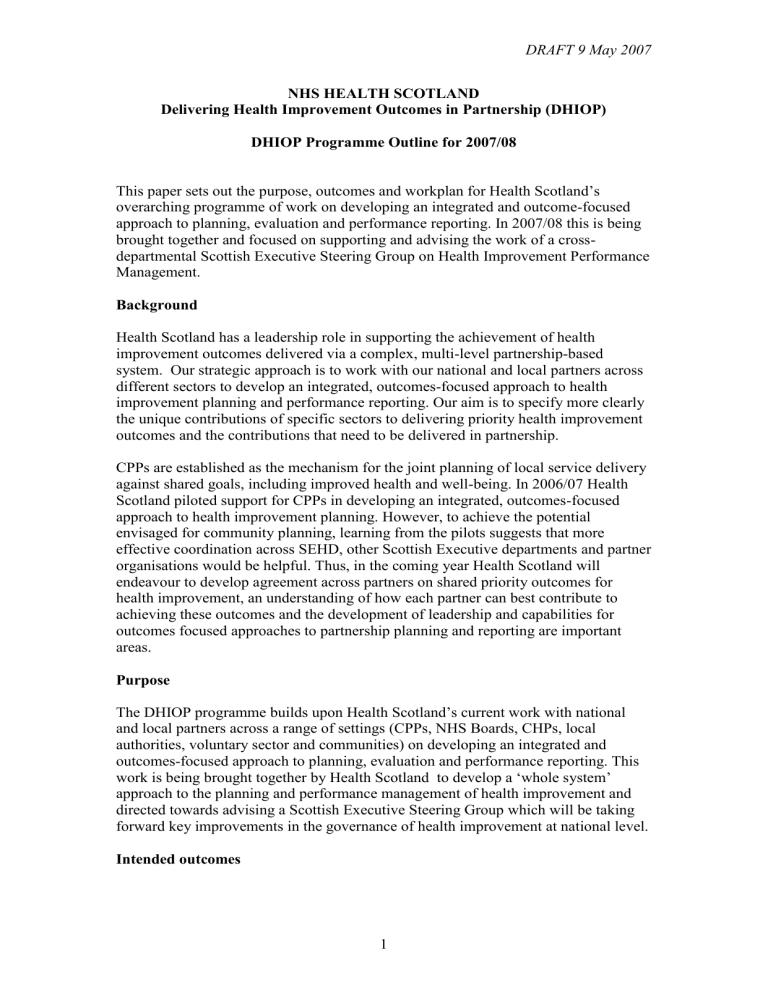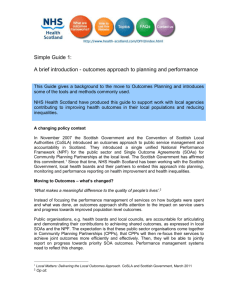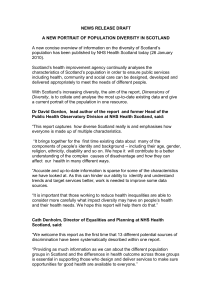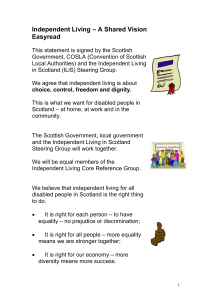(or horizontal) governance for health improvement

DRAFT 9 May 2007
NHS HEALTH SCOTLAND
Delivering Health Improvement Outcomes in Partnership (DHIOP)
DHIOP Programme Outline for 2007/08
This paper sets out the purpose, outcomes and workplan for Health Scotland’s overarching programme of work on developing an integrated and outcome-focused approach to planning, evaluation and performance reporting. In 2007/08 this is being brought together and focused on supporting and advising the work of a crossdepartmental Scottish Executive Steering Group on Health Improvement Performance
Management.
Background
Health Scotland has a leadership role in supporting the achievement of health improvement outcomes delivered via a complex, multi-level partnership-based system. Our strategic approach is to work with our national and local partners across different sectors to develop an integrated, outcomes-focused approach to health improvement planning and performance reporting. Our aim is to specify more clearly the unique contributions of specific sectors to delivering priority health improvement outcomes and the contributions that need to be delivered in partnership.
CPPs are established as the mechanism for the joint planning of local service delivery against shared goals, including improved health and well-being. In 2006/07 Health
Scotland piloted support for CPPs in developing an integrated, outcomes-focused approach to health improvement planning. However, to achieve the potential envisaged for community planning, learning from the pilots suggests that more effective coordination across SEHD, other Scottish Executive departments and partner organisations would be helpful. Thus, in the coming year Health Scotland will endeavour to develop agreement across partners on shared priority outcomes for health improvement, an understanding of how each partner can best contribute to achieving these outcomes and the development of leadership and capabilities for outcomes focused approaches to partnership planning and reporting are important areas.
Purpose
The DHIOP programme builds upon Health Scotland’s current work with national and local partners across a range of settings (CPPs, NHS Boards, CHPs, local authorities, voluntary sector and communities) on developing an integrated and outcomes-focused approach to planning, evaluation and performance reporting. This work is being brought together by Health Scotland to develop a ‘whole system’ approach to the planning and performance management of health improvement and directed towards advising a Scottish Executive Steering Group which will be taking forward key improvements in the governance of health improvement at national level.
Intended outcomes
1
DRAFT 9 May 2007
1.
National level priority outcomes for health improvement are identified and agreed across national and local partners.
2.
The unique and partnership contributions of each sector to delivering the priority health improvement outcomes are clearly specified and agreed
3.
A 'whole system' approach to performance reporting on HI outcomes is agreed with national and local partners
4.
Leadership and capabilities for outcome planning and performance reporting are developed at national and local levels.
The DHIOP programme
This new programme brings together and coordinates work at three levels:
New DHIOP Programme – three levels
SE Steering Group
HI Governance
HS programme – Delivering HI Outcomes in Partnership
Health
Scotland
Outcome planning
& reporting
Piloting an integrated outcome-focused
NHS Boards
Performance management of HI
CPPs approach to HI planning
Local Government
New outcome-based performance framework
Community &
Voluntary sector
Outcome planning and evaluation
CHPs
1) Scottish Executive Steering Group on Health Improvement Performance
Management
This programme of work will report directly into a high level cross-departmental
Steering Group being established by the Scottish Executive Health Department and comprising senior policy-makers, officials and Chief Executives.
The Steering Group will develop outcomes-focused performance management arrangements for health improvement appropriate to a cross-sector partnership delivery system.
The role of the Steering Group is:
To integrate and rationalise the work on delivering health improvement outcomes and any resulting guidance on planning and performance management
To provide national level leadership for a culture of improvement and results based reporting around delivering health improvement outcomes
2
DRAFT 9 May 2007
To bring greater coherence and synergy to cross-sectoral contributions to delivering health improvement outcomes
To develop the foundations for a system of cross-sector (or horizontal) governance for health improvement
A proposed work programme for the Steering Group is outlined below:
Dates Meeting Purpose of the meeting:
1. Role, remit, membership of Steering Group and work programme
2. An outcomes focused approach to integrated planning and reporting on results across a ‘whole system’ – a SE-HS workshop for senior policy-makers and Chief Execs on results based planning, evaluation and performance reporting with John Mayne (to be confirmed)
3.
4.
5.
What are the national level priority outcomes for health improvement? Framework for reporting on priority HI outcomes
How will these national level HI outcomes be delivered?
Who contributes what? Framework for delivery planning, performance monitoring and reporting on the results of delivery across sectors
Developing capacity, leadership and capabilities for an outcomes approach across the system – what is needed?
6. Piloting innovation - How can we maximise the learning from evaluating new approaches to delivery so that this is built into improvement processes?
7. Concluding meeting – moving to the next stage of implementing and monitoring these changes
The proposed membership of the Steering Group is given in Annex 1.
Roles
It is Health Scotland’s role to provide evidence-informed and professional advice on improving Scotland’s health and to engage with local delivery partners in the process to ensure the inclusion of their perspectives. In this instance, Health Scotland will also fulfil a professional secretariat role for the Steering Group. It is the Scottish
Executive’s role to engage across Scottish Executive departments to deliver any changes in governance and performance management.
3
DRAFT 9 May 2007
2) The DHIOP programme
DHIOP is an overarching programme that builds on the existing work of the organisation and is seeking to develop a ‘whole system’ cross-sector approach to delivering shared health improvement outcomes, with a view to adding value to the sector-specific work and enhancing the potential effectiveness of CPPs at local level.
The main aim of the DHIOP programme is to support and advise the Steering Group on Health Improvement Performance Management in the following areas:
1.
To agree national level priority outcomes for health improvement
2.
To agree a whole system approach to delivering these outcomes – is the current delivery system fit for purpose?
3.
To develop leadership and capabilities to take forward outcomes-focused approaches
4.
To agree a framework for whole system reporting on agreed HI outcomes, including performance in delivering outcomes and on improvements required
5.
To agree an approach to piloting and evaluating new approaches/initiatives to health improvement with a view to generating and embedding learning across the whole system
Plans for the delivery of these objectives are set out in a series of tables below.
3) Health Scotland projects within key delivery settings
The DHIOP programme is linked with, and builds upon, a series of Health Scotland projects for specific settings and partners; each of these projects has their own rationale, set of objectives, outputs and timescales. To varying degrees, these projects are all seeking to develop an outcomes focused approach to health improvement planning, evaluation and performance reporting within key delivery settings – within
Health Scotland, with NHS Boards, with Local Government, with the Community-led
Task Force. All the projects are being delivered through joint work across Health
Scotland’s Policy Evaluation & Appraisal (PEA) and Healthy Settings teams. The projects are outlined in Annex 2.
4
DRAFT 9 May 2007
Objective 1: To agree national level priority outcomes for health improvement
Coordinator: Erica Wimbush
Input:
HS Lead/Staff
Julia Murphy
(Lead)
Lorna Renwick
Lynda Brown
Julia Murphy
(Lead)
Lorna Renwick
Della Thomas
(Lead)
Avril Blamey
Clare Beeston
Della Thomas
(Lead)
Avril Blamey
Clare Beeston
Input:
HS Budget
PEA
PEA
Local Govt
Local Govt
Activities
Engagement with NHS Boards
Consultation Seminar as part of Review of
Performance Management for HI within NHS
Engagement with CHPs and Primary care
As part of consultation stage for
Engagement with local councils
Planning meeting with key stakeholders
Consultation seminar
Review of
Performance Management for HI within NHS
Engagement with CPPs
Discussion with CPP Pilots Steering Group
Consultation seminar facilitated by SURF
David Gordon
(Lead)
With ScotPHO
PHO Analysis of population level data to assess contribution of different risk factors and social determinants to key health outcomes for priority population groups
Planning meeting with ISD
Milestones/Outputs Timetable
Seminar with NHS Boards
Summary report from seminar
17 April 2007
3 May 2007
To be determined Aug-Sept
2007
Note of meeting
Summary report from seminar
1 May 2007
31 May 2007
Note of meeting
Summary report from seminar
June 2007
Wb 9 July
2007
ScotPHO paper
5
DRAFT 9 May 2007
Objective 2: To agree a whole system approach to delivering these outcomes – is the current delivery system fit for purpose?
Coordinator:
Input:
HS Lead/Staff
Della Thomas
Input:
HS Budget
Activities Milestones/Outputs Timetable
Lorna Renwick
Della Thomas
Community Planning Partnerships
The partnership planning and delivery process
CPP governance arrangements
The contribution of the NHS and the public health/health improvement function including
Health Scotland
Area NHS Boards
CHPs
Acute sector/hospitals
Contributions of local authority services
COSLA, SOLACE
Mainstream services
HI function
Lizanne Conway
(Lead)
Contributions of community and voluntary sector to delivering HI outcomes
CHEX to provide a paper that will identify and illustrate community-led contributions to HI outcomes using examples from evaluations or case studies
VHS ??
6
DRAFT 9 May 2007
Objective 3: Developing capacity, leadership and capabilities to take forward outcomes-focused approaches
Coordinator:
Input:
HS Lead/Staff
Input:
HS Budget
Bron McDonald PEA
Activities Milestones/Outputs Timetable
Julia Murphy
Wilma Reid
PEA
L&WD
International expertise on outcomes approach
Challenges and lessons in implementing outcome-focused planning and performance management. John Mayne o Joint seminar with SE ASD for senior policy makers and
Chief Execs o Workshop with HS Senior Managers, Program Managers and
Partners involved in DHIOP projects
A development programme considering systems, lessons and expertise from elsewhere to highlight:
Examples of approaches being used elsewhere to performance manage a range of health service organisations delivering health improvement outcomes and reducing inequalities? Are they effective and potentially relevant to Scotland?
Approaches to monitoring and reporting on public policy performance where delivery is via partnership networks that may be relevant to health improvement? What can Scotland learn/borrow from these?
Leadership for HI Programme
New component on leadership skills for outcome planning and performance management
7
DRAFT 9 May 2007
Objective 4: To agree a framework for whole system reporting on agreed HI outcomes, including performance in delivering outcomes and on improvements required
Coordinator:
Activities Milestones/Outputs Timetable Input:
HS Lead/Staff
Input:
HS Budget
Objective 5: To agree an approach to piloting and evaluating new approaches/initiatives to health improvement with a view to generating and embedding learning across the whole system
Coordinator:
Input:
HS Lead/Staff
Input:
HS Budget
Activities Milestones/Outputs Timetable
8
DRAFT 9 May 2007
ANNEX 1: Steering Group for Health Improvement Performance Management
Proposed membership
Scottish Executive
Kenneth Hogg – Head of Public Health & Substance Misuse
Kay Barton – Head of Health Improvement Strategy
Peter Donnelly – Deputy Chief Medical Officer
Kathleen Bessos - Primary Care
Alistair Brown - Performance Management
Social Inclusion & Voluntary Issues
SEED
SEERAD
National Agencies
Graham Robertson – Chief Executive of Health Scotland
Angelina F – Chief Executive of Communities Scotland
Audit Scotland -
COSLA – membership agreed, Officer to be identified
Local
Local Authorities – Mary Castles, North Lanarkshire
NHS Boards – Fiona Mackenzie, Catriona Renfrew
CPPs – Chair
CHPs – Chair
ANNEX 2:
Health Scotland Projects Contributing to the DHIOP Programme
Review of Performance Management for Health Improvement within the NHS
Project Lead: Julia Murphy
The specific objectives of the review are:
1) To agree what are the main ways in which NHS organisations contribute to the delivery of health improvement outcomes and targets
2) To agree a set of meaningful indicators and measures of NHS performance that help track progress in these areas. As a sub-set of this, to agree which might be appropriate for the ‘Health improvement’ section of the HEAT targets
3) To advise on an approach to performance management and reporting appropriate for the wider system of health improvement
Support for Local Councils and CPPs in integrated outcome-focused planning
Project Lead: Della Thomas
1) Three pilot CPPs have been supported and consulted with in the development of outcome focused planning for health improvement (2006/07). The results of the consultancy work is being cascaded and reported upon in 2007/08. A report will be produced, published and learning shared. Support for CPPs will be taken forward as recommended e.g. by establishing a network for those developing outcome focused plans.
9
DRAFT 9 May 2007
2) We will support and advise the health improvement component of the single outcome agreement developed with West Lothian Council as part of the public services reform agenda. We will set up a process to share this learning with the other three PSR pathfinder councils.
3) Using the evidence base on the impacts of alcohol use on individual health and community well being, an integrated outcome focused plan for alcohol will be developed for Angus Alcohol Partnership with clear monitoring and performance plans.
4)
Using the evidence from the HIA of local council’s greenspace work in 2006/07, work is being progressed to assist two local councils and their NHS partners to identify how they contribute to health improvement outcomes through the contributions of greenspace to physical activity and mental health outcomes.
Outcomes Planning & Evaluation for Community Led Actions
Project Lead: Emma Halliday
This work is taking forward the Community-led Task Force Recommendations 1 & 2 -
1)
Identify and set out more clearly the links between objectives, inputs, outputs and
2) outcomes, defining success in ways that reflect a broad view of health and its determinants.
Use evaluation designs and methods that recognise the timescales and complexities involved in assessing and demonstrating the impact of community-led activity
Results-based planning and corporate reporting in Health Scotland
Project Lead: Bron McDonald
To strengthen Health Scotland’s focus on the results of their activities utilising outcome planning and reporting, cyclical review and evaluation. The strategy map will form the basis for corporate outcomes. A range of work across the organisation will be selected as case studies to develop and demonstrate outcome planning and reporting in practice, while and a planning colloquium and consultancy support will be available to revise reporting on
2007/08 and business planning for 2008/09.
10





